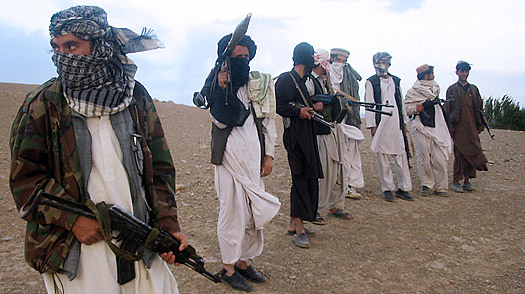India Raises Questions About Foreign Fighters in Afghanistan
Taliban fighters

NEW DELHI: In a veiled attack on Pakistan, India has raised concern about the number of foreign fighters in Afghanistan, and how they got there. Speaking at the Security Council debate on the the UN Assistance Mission for Afghanistan (UNAMA), India’s ambassador to the body, Asoke Mukerji, said that India has "noted with concern" the reference to an Afghan Ministry of Interior estimate that 7,180 'foreign fighters' are presently in Afghanistan.
“It is obvious that they could not have entered Afghanistan, or continue to sustain their terror attacks without support from beyond Afghanistan's borders," Mukerji said, referring to the latest report of the Secretary General that states that there has been a 45 percent increase in armed clashes in this period of 2015 compared to a similar period last year. In fact, 2015 is set to become Afghanistan’s bloodiest year in terms of civilian casualties if trends continue.
"These statistics are a matter of concern for India and the international community. It only reinforces our view that terrorism, and not tribal differences or ethnic rivalries is the main source of insecurity and instability in Afghanistan," Mukerji said.
The Indian envoy added that the spurt in violence is all the more problematic as Afghanistan is in the midst of a historical" political transition, where the Afghan President -- Ashraf Ghani -- represents the first democratic transfer of power in the country.
"Given the critical phase that the political transition has entered, and the deteriorating security situation, we feel there is a strong case for the international community to take a fresh look at the manner in which the drawdown of the international military presence in Afghanistan is being planned out," he said.
The envoy also referred to the Afghan government’s efforts to launch a peace process with Afghanistan -- which, ironically, Pakistan has made possible by leveraging its influence on militant groups in the country.
"India will continue to support a truly Afghan-led and Afghan-owned reconciliation process within the framework of the Afghan constitution and the internationally accepted red lines," the envoy said.
Meanwhile, the Taliban continues to gain ground in Afghanistan, with the weekend seeing two major developments that demonstrate that the militants are not going to back down. Most recently, on Sunday, the Afghan parliament was attacked resulting in at least five casualties and injuring another 30 people.
A few days before that, reports indicated that the Taliban was dvancing on the capital of a key northern Afghan province after having captured its adjoining district. The Taliban captured Kunduz after launching its “spring offensive” in April, setting civilian casualties skyrocketing. The violence has placed civilian casualties at their highest in 2015, compared to similar durations in preceding years.
Meanwhile, reports circulate on talks to discuss the potential modalities of comprehensive peace negotiations with Taliban representatives. At a press conference last week, Ministry of Foreign Affairs (MoFA) spokesman Ahmad Shekib Mustaghni confirmed that the government had sent the delegation, which, led by Mohammad Mohaqeq, the Second Deputy of Chief Executive Abdullah Abdullah, also includes Deputy Foreign Minister Hikmat Khalil Karzai, former speaker of parliament Mohammad Younas Qanooni, former minister of women's affairs Husn Bano Ghazanfar, former minister of commerce Anwarulhaq Ahadi and a member of the High Peace Council (HPC), Farhadullah Farhad.
As the prospect of talks loom just out of reach, the Taliban continues to step up violence. In fact, in its annual report released earlier in the year, the UN Mission in Afghanistan has said that the number of civilians killed or wounded in the troubled country climbed by 22 percent in 2014 to reach the highest level since 2009.
The UN agency documented 10,548 civilian casualties in 2014, the highest number of civilian deaths and injuries recorded in a single year since 2009. They include 3,699 civilian deaths, up 25 per cent from 2013 and 6,849 civilian injuries, up 21 per cent from 2013. Since 2009 -- when UNAMA began tracking casualties -- the armed conflict in Afghanistan has caused 47,745 civilian casualties with 17,774 Afghan civilians killed and 29,971 injured.
The UN says that Taliban militants -- who have been waging an insurgency in Afghanistan since a US-led invasion toppled their government 13 years ago -- were responsible for 72 per cent of all civilian casualties, with government forces and foreign troops responsible for 14 percent.



